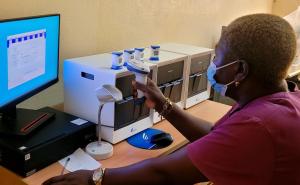Equatorial Guinea has made remarkable progress in its fight against tuberculosis (TB), with screening rates increasing significantly from 34% to 87% between 2020 and 2023. This progress is thanks to the implementation of a national strategy supported by World Health Organization (WHO) and the adoption of cutting-edge diagnostic tools.
Among these tools, GeneXpert – a device provided by WHO – plays a crucial role. As Dr Ana Bella Ekiri, Head of the Tuberculosis and HIV Programme at the WHO Country Office in Equatorial Guinea explains, “These new devices enable early, rapid and accurate diagnosis, particularly for multidrug-resistant tuberculosis (MDR-TB) and benefit in particular the most vulnerable populations”.
In 2023, 95% of people who fell ill with TB were diagnosed using rapid tests. GeneXpert can detect TB in just two hours, compared with several weeks using traditional methods. These tests have doubled the number of MDR-TB cases reported, revealing high rates in prisons and hospitals, where overcrowding encourages transmission. In the same year, people presenting with multidrug resistance accounted for 92% of diagnosed cases, underlining the need for urgent action to combat this public health crisis.
Despite the rise in MDR-TB cases since 2017, Equatorial Guinea is working hard to achieve the Sustainable Development Goals target of eliminating TB by 2030. WHO continues to provide technical and logistical assistance, focusing on combating MDR-TB. Specialized training, clinical guidelines update, the integration of tuberculosis diagnosis and treatment into HIV care units, and a proactive search for undiagnosed cases within communities are at the heart of this intervention.
Joana, a recovered patient, says, “I was very sick and worried when I arrived at the hospital. I believed it was HIV; but thanks to the rapid tests, I soon knew it was TB. I thought my life was over, but as time went on, I realized that it was an illness like any other that I could overcome.”
WHO has built local capacity by carrying out regular field supervision and supporting the training of 50 health professionals to improve MDR-TB case management.
“Training has enabled us to detect TB earlier and to avoid late treatment, which has considerably improved patient care,” explains Dr Manuel Eyene Bacale Ayeto, Regional Coordinator for the prevention and control of STIs, HIV/AIDS, TB and viral hepatitis in Equatorial Guinea.
WHO and local health authorities are also working to make screening and treatment services accessible in all the country’s health centres, including HIV treatment units. TB/HIV co-infection remains the leading cause of death among people living with HIV in the African region.
“The incidence of TB remains high, with 275 new cases detected each year per 100 000 population. Its constant increase is mainly due to the growth of the HIV epidemic,” explains Dr Leticia Ondo Ayecaba, Head of the TB Control Programme at the Ministry of Health.
The integrated one-stop-shop approach, which combines TB and HIV care, has also helped to improve treatment outcomes. “To halt the spread of TB, we have increased access to treatment and stepped up prevention efforts, particularly for people living with HIV, contacts of TB patients and other high-risk groups,” Dr Ayecaba adds.
Since 2022, the treatment success rate has grown, increasing from 67% in 2020 to 74% in 2023. Equatorial Guinea plans to set up a national reference laboratory for the culture of MDR-TB strains, to strengthen the country’s capacity to respond effectively to this health crisis.
“What motivates me is seeing patients go home and returning for their medication once they have recovered from the active phase of the disease. We all have a role to play in TB eradication,” says Dr Ayeto.
World Health Organization







OTHER ARTICLES
Editorial — Prevent, inform, and act for women’s health in Africa
Kenya : Government Prioritises Maternal Health and Strengthens Support for Community Health Promoters
Strengthening pandemic prevention, preparedness, and response capacities in Senegal using the “One Health” approach